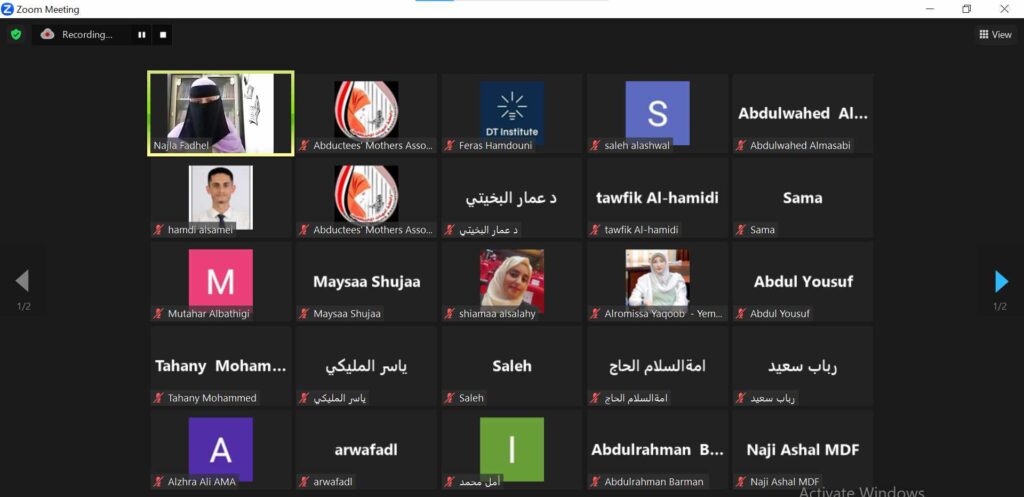On the occasion of International Human Rights Day on December 10th, the Abductees’ Mothers Association a member of the “Justice for Yemen Pact”, conducted a workshop titled “Exchanging Experiences Among Human Rights Organizations to Enhance Advocacy Efforts in Yemen.” The event took place on Saturday evening via Zoom.
The first session, led by Judge Ishqra Al-Maqtari, a National Commission Member to Investigate Alleged Violations to Human Rights (NCIAVHR), focused on “Building Partnerships and Alliances to Enhance Human Rights Activities.” Al-Maqtari emphasized the importance of forming joint alliances given the challenges faced by civil society and human rights activists in the current chapter of Yemen.
Judge Al-Maqtari highlighted that the greatest importance of alliances lies in the presence of oppressive authorities and a significant increase in human rights violations. The state’s failure to implement reforms has led society to view civil society organizations as a salvation from the current situation. This poses various challenges for alliances, with one of the most prominent being the repressive legal environment created by authorities, imposing significant restrictions on granting licenses to organizations. This necessitates diligent efforts from organizations to build a human rights memory for all areas in Yemen and work on comprehensive monitoring and documentation within an alliance to strengthen the human rights movement within Yemen.
On his part, Firas Hamdouni, Program Director for Yemen at the DT Institute, affirmed in his second workshop session titled “The Role of Alliances in Enhancing Collective Voice and Impact in Human Rights Issues – Justice for Yemen Pact as a Model,” that building alliances among local civil society organizations plays a crucial role in defending human rights in Yemen. It amplifies the voices of advocates, strengthens pressure efforts against entities committing violations, enhances the impact of advocacy endeavors, prevents the repetition of activities, contributes to their diversity, ensures public benefit, and facilitates resource provision. Additionally, the existence of a common alliance is essential to bolster mechanisms of justice and accountability in Yemen for the anticipated transitional justice phase.
In the third session, “Appropriate Means for Exchanging Experiences and Knowledge Among Human Rights Organizations,” Ms. Maysa’a Shujaa Al-Din, a leading researcher at the Sana’a Center for Strategic Studies, and responsible for the justice and reconciliation dossier, addressed the concept of exchanging experiences among civil society organizations. She described it as essential for coordination and avoiding the replication of efforts that serve human rights issues in Yemen. The exchange of experiences elevates the performance levels of organizations in the documentation process, amplifying the voices of claimants demanding accountability, justice, compensation, etc. Additionally, a joint alliance provides a strong impetus for presenting itself on the international stage.
The workshop’s fourth and final session was presented by Tawfiq Al-Humaidi, the head of the SAM Organization for Rights and Liberties, titled “Challenges Facing Human Rights Organizations and How to Overcome Them.” He emphasized that human rights issues are now on trial, facing complex challenges related to credibility, non-discrimination, and on-the-ground effectiveness. However, institutions and organizations remain a legitimate and ethical emergence for the human rights system that they have fought for at all levels.
He added that Yemen, for years, has produced many organizations that have worked diligently despite limited resources. They have faced many challenges, with the primary one being the security challenge, as conflict parties view these organizations with suspicion and classification. This has weakened the spread of organizations and affected their ease of movement in Yemeni areas.
He also pointed out that the lack of funding has had a significant impact on multiple levels, affecting both the continuity and quality of work. This situation has led many organizations to stagnate for some time without the ability to evolve. Additionally, there is a shortage of human resources, administrative structures, and internal regulations. This is compounded by challenges such as discrimination, legal issues, and political hurdles.
Al-Humaidi further mentioned several external challenges, including limited access to the international community and funding limitations. Regional conflicts, due to the attention they receive, have resulted in neglecting the issue of human rights in Yemen. These challenges can be overcome through alliances and concerted efforts.
The workshop concluded with the following outcomes, aiming to highlight:
- The importance of exchanging knowledge and experiences among human rights organizations within the framework of alliances.
- Enhance cooperation and coordination among organizations, illustrating its impact on advocacy efforts.
- Contribute to developing an effective advocacy strategy through alliances between human rights organizations.
- Encourage participants to establish new alliances and exchange expertise and resources.
The workshop, attended by over 30 activists, human rights advocates, lawyers, journalists, and local mediators, highlighted the significance of establishing an alliance comprising human rights organizations and local mediators to find solutions to challenging human rights issues, with a particular focus on the plight of detainees and enforced disappearances.

